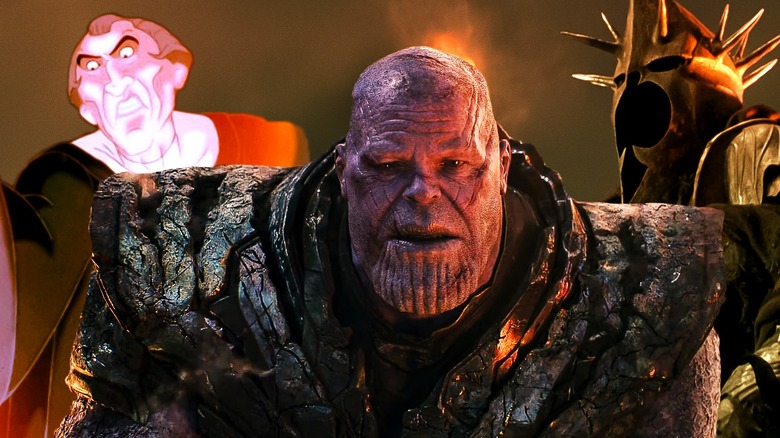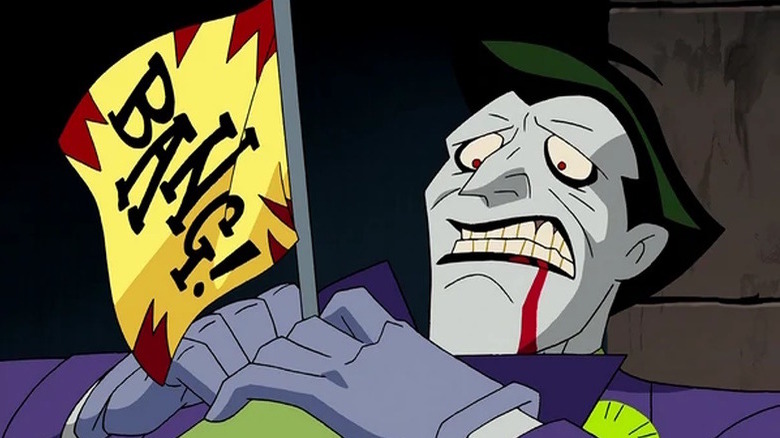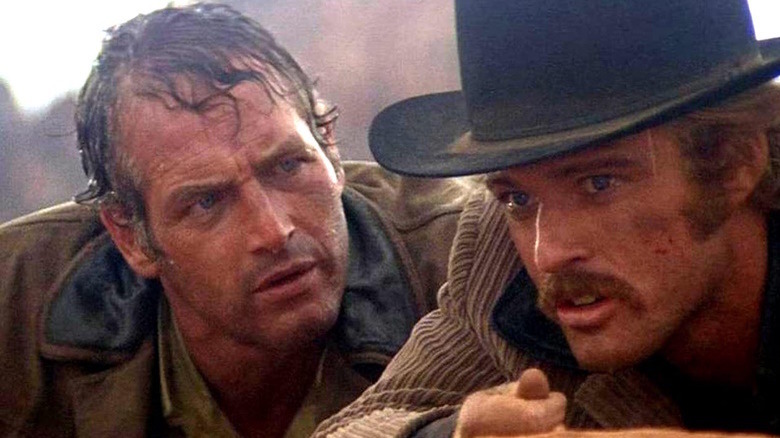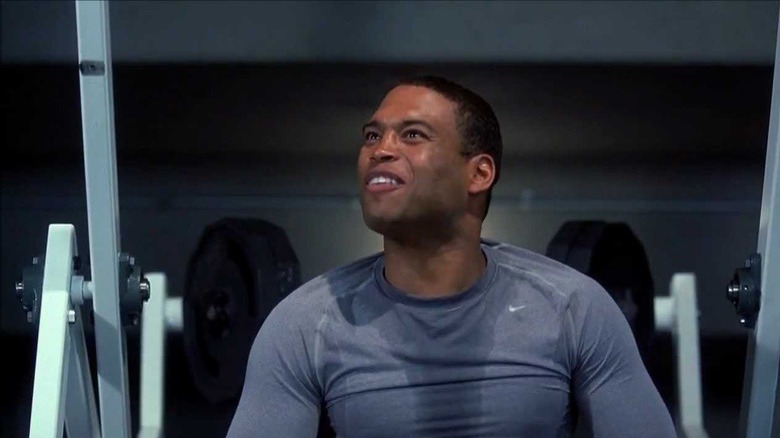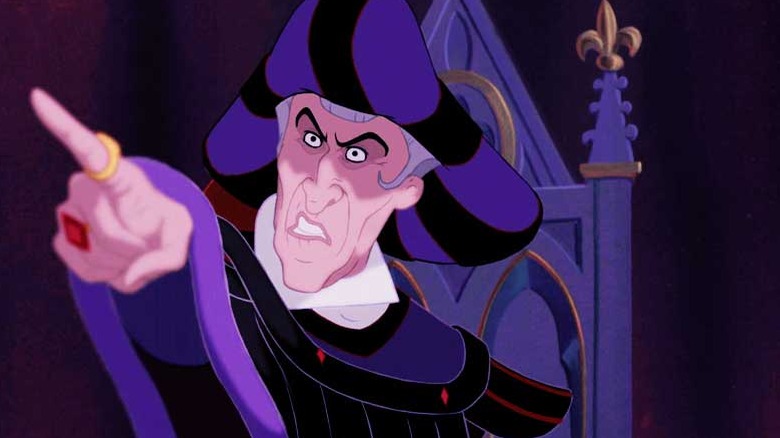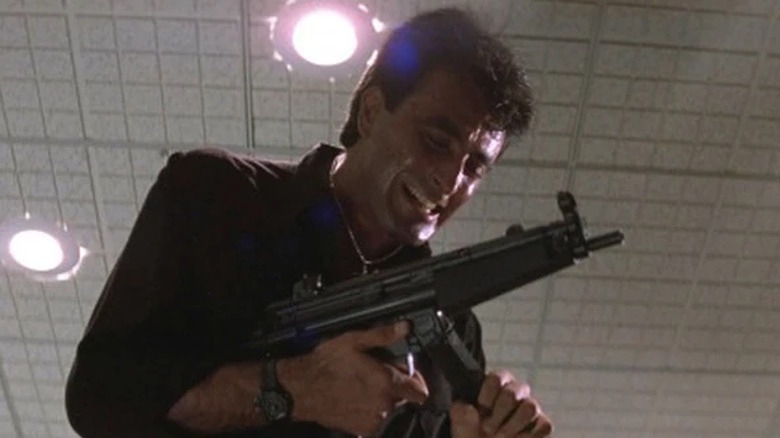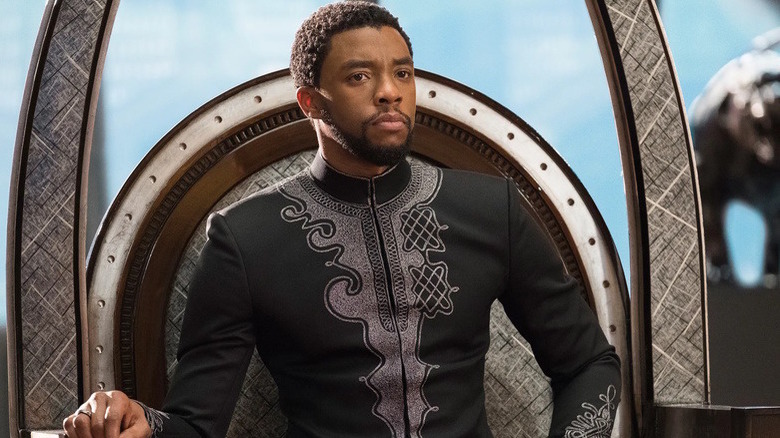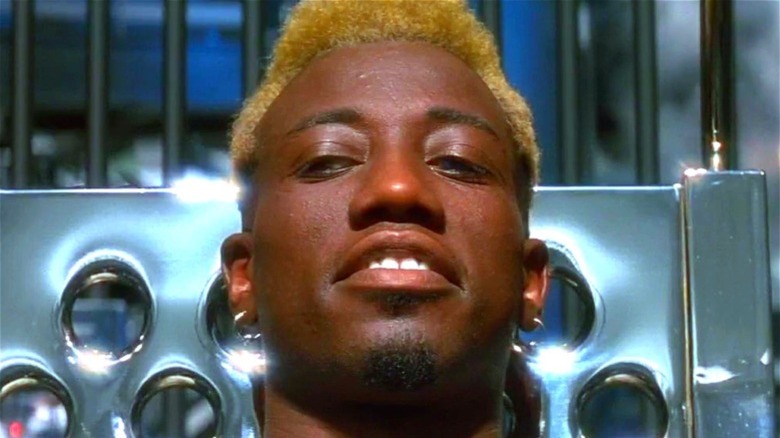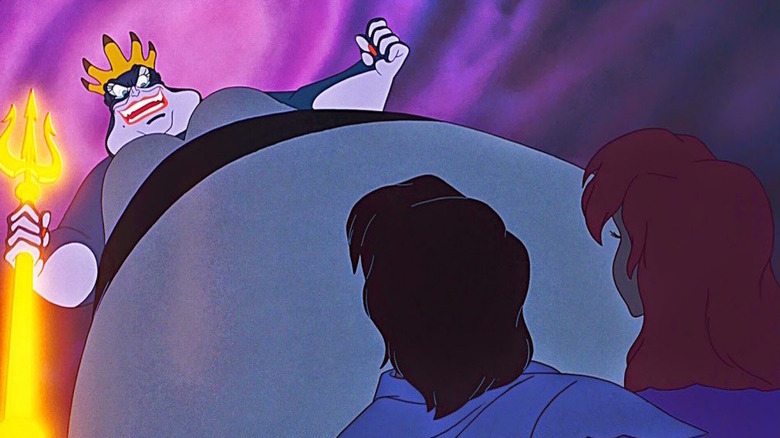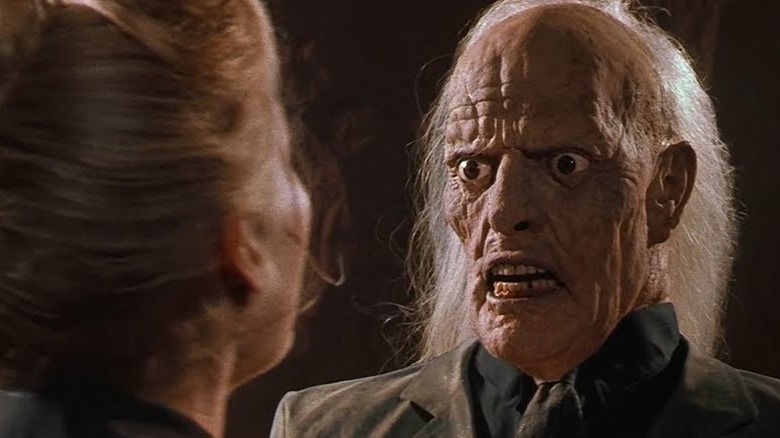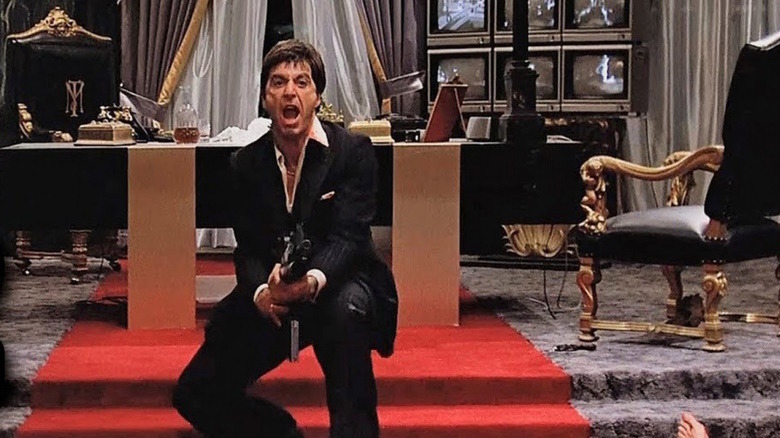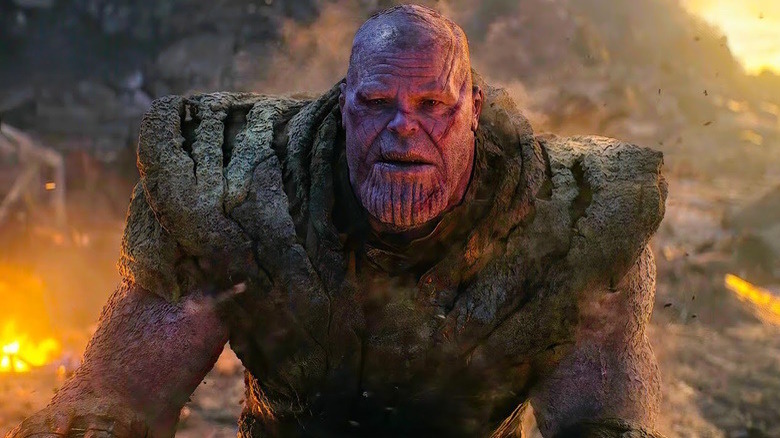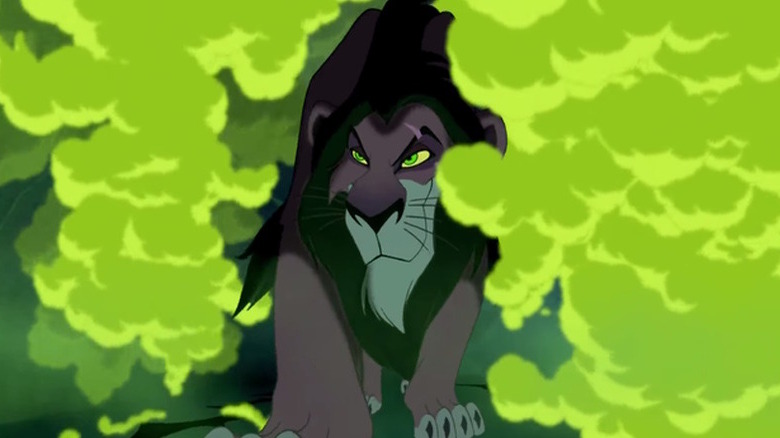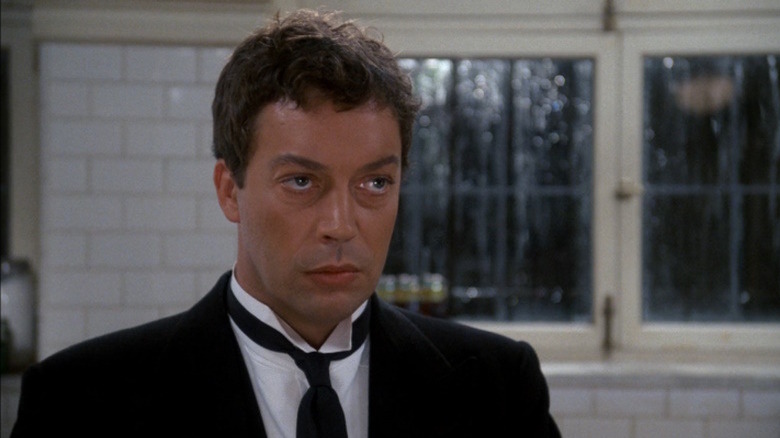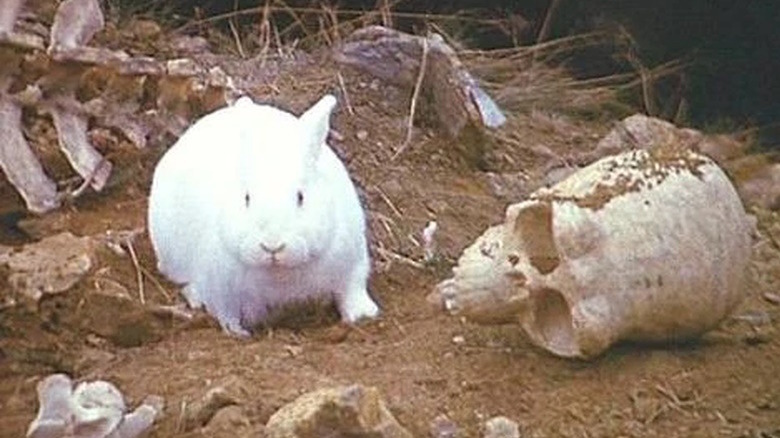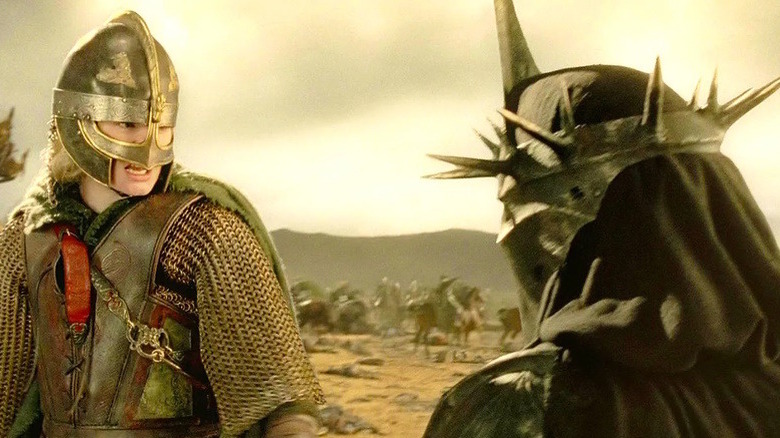Most Ironic Final Words In Movies
Oddly enough, a film character's most memorable line is often their last. For example, Charles Foster Kane's enigmatic dying word "Rosebud" jumpstarts the events of "Citizen Kane" and sums up all of his regrets. Anti-hero Yondu makes audiences weep when he sacrifices himself to save his surrogate son, Peter Quill, letting him know, "I'm d*** lucky you was my boy."
Sometimes, however, a character's last line doesn't only elicit sadness but also ironic laughter and genuine shock. Most people don't see their end approaching, and their final words can seem hilariously inappropriate — or tragically appropriate — when examined in retrospect. Screenwriters realize this and enjoy scripting lines that let the character leave on a completely unexpected note.
The following fifteen characters use their last breaths to utter some very ironic final words. While few of them would probably want these lines inscribed on their tombstones, most audiences would agree their final lines are some of their most memorable words.
The Joker couldn't see the humor in his death
In "The Dark Knight," the Joker (Heath Ledger) famously tells a cop, "In their last moments, people show you who they really are." He demonstrates this later when he nearly falls to his death while laughing hysterically. However, not all versions of the Joker found their deaths quite so funny.
For instance, Mark Hamill's animated Clown Prince of Crime has been terrorizing Gotham since he first appeared in "Batman: The Animated Series." Considered one of the definitive interpretations of the Joker, Hamill would go on to voice the Joker in several "Batman" animated series opposite Kevin Conroy's Batman, even showing up in the "Batman Beyond" animated movie "The Return of the Joker." In it, we get to witness how this Joker meets his end.
After brainwashing Batman's sidekick Robin and turning him into a miniature version of himself, Joker hands the boy a gimmicked gun and tells him to "deliver the punchline" by shooting Batman. Instead, Robin recovers a bit of his sanity and fatally shoots the Joker instead. The Joker's final words? "That's not funny. That's not..."
It's a highly ironic final line for a villain whose entire criminal career was built on sharing his sick sense of humor with the world. Although the Joker finds a way to briefly resurrect himself years in the future, his end at the hands of Robin offers a strangely satisfying end to his arc.
Butch Cassidy played down his inevitable demise
Real-life outlaws Butch Cassidy and the Sundance Kid evaded death multiple times in their criminal careers. Their story became the stuff of legend and was eventually turned into a 1969 Wild West buddy film starring Paul Newman as Cassidy and Robert Redford as Harry "The Sundance Kid" Longabaugh. Loosely based on real events, the movie follows the likable thieves as they pull off daring train robberies, hide out in brothels, and run from a posse dead set on gunning them down.
Throughout the film, the two display an almost laid-back attitude toward death. When they need to jump off a cliff and into a river to evade their pursuers, Sundance admits he can't swim — prompting Cassidy to reassure him that the fall will probably kill him first. Unfortunately, their luck runs out when they move to Bolivia and get cornered by the local police. Wounded, the two hide out in a nearby building where Cassidy asks if relentless lawman Joe Lefors is among the troops waiting for them. After Sundance assures his partner he didn't see him, Cassidy exclaims in relief: "Oh good. For a moment there, I thought we were in trouble."
A second later, the two burst out, guns blazing — and are promptly shot to death by the Bolivian troops. It's an end almost everyone in the audience knew was coming, yet it's offset by Cassidy's almost lighthearted final words.
Final Destination left kids in denial about their impending doom
The "Final Destination" movies all follow a group of teenagers who manage to cheat Death, only to find themselves dying in ironic ways one by one as the Grim Reaper collects his intended victims. Naturally, the kids try to do everything they can to stay alive, but some display more cockiness about this than others.
In "Final Destination 3," fitness buff Lewis Romero (Texas Battle) is about to board the Devil's Flight roller coaster when fellow classmate Wendy Christensen (Mary Elizabeth Winstead) has a premonition about the roller coaster crash. Ignoring her warning, Lewis gets into a fight with another teen and gets kicked off the ride. Shortly after, the coaster crashes, and Lewis seemingly escapes his death.
Despite this reminder of his mortality, Lewis remains arrogant, claiming Death is scared of him. When Wendy and fellow survivor Kevin visit him at the gym to warn him that he's still on Death's list, Lewis ignores them and continues working out on his Bowflex machine, shouting: "**** Death! I just win! That's all I know how to do, Kevin! Baby, I just win!"
A few seconds later, the weightlifters around him start a chain reaction that cuts the wires to the weights on Lewis' Bowflex machine. Still convinced he's invincible, Lewis lifts one more time — and the severed weights fall and crush his head. Clearly, he didn't realize that Death always wins in the end.
Frollo didn't realize he was predicting his own death
Judge Claude Frollo (Tony Jay) from Disney's "The Hunchback of Notre Dame" may not be the best-known animated villain, but he's easily one of the cruelest. A powerful judge in 19th-century France, Frollo views himself as a morally superior man. However, he's really a lustful sadist who murders a fleeing mother and then becomes an abusive stepparent to her orphaned son, the hunchback Quasimodo (Tom Hulce).
When Frollo finds himself attracted to the gypsy Esmeralda (Demi Moore), he refuses to acknowledge his own feelings, convincing himself that Esmeralda has somehow bewitched him. This causes him to try and burn her at the stake when she rejects his advances. Quasimodo intervenes, and the two battle on top of a bell tower as molten lead burns below. Still unwilling to admit his sinful nature, Frollo projects his failings onto Quasimodo and Esmerelda, telling the gypsy: "And He shall smite the wicked and plunge them into the fiery pit!"
An instant later, the ledge beneath his feet crumbles, and Frollo plunges into the hellish inferno, showing that his choice of punishment was very appropriate — he just didn't realize the villain being punished was himself.
A Die Hard henchman gave John McClain some good parting advice
Action movies are famous for their disposable henchmen. From the Empire's Stormtroopers to the Nazis in the "Indiana Jones" franchise, if you're an evil minion, odds are you'll be killed in an ironically embarrassing way long before the credits roll.
That's definitely the case for Marco (Lorenzo Caccialanza), an Italian terrorist employed by Hans Gruber (Alan Rickman) in "Die Hard." After helping Gruber take over the Nakatomi Plaza, Marco and the rest of Gruber's henchmen need to take down John McClane (Bruce Willis), a New York cop who finds himself locked in the tower with the thieves. Although Gruber's men are better armed, McClane's wily nature allows him to stay one step ahead of the gang.
At one point, Marco sees McClane dive for cover beneath a conference table and starts firing his submachine gun into the table, forcing McClane to crawl out. However, his overzealous shooting causes him to quickly run out of bullets. Still believing he has the upper hand, Marco slams a fresh magazine into his gun, saying: "Next time you have a chance to kill someone, don't hesitate!"
In response, McClane shoots multiple rounds through the table, straight into Marco. Thanking the dead terrorist for the good advice, McClane throws Marco's body out the window where it lands on a police car and finally brings the cops to the building. Who knew bad guys could be so helpful?
The Black Panther couldn't see his own death coming
While many ironic deaths are humorous, one death scene on this list is just heartbreaking. At the end of "Avengers: Infinity War," the alien warlord Thanos (Josh Brolin) succeeds in claiming all six Infinity Stones and becomes a virtually all-powerful being. Seeking to end universal overpopulation, Thanos snaps his fingers, and half of all life forms begin dying.
Shocked, King T'Challa (Chadwick Boseman) offers his hand to his fallen Dora Milaje general Okoye (Danai Gurira), telling her: "Up, general! Up! This is no place to die."
An instant later, T'Challa crumbles into dust, a victim of Thanos' snap. Although he would be resurrected in "Avengers: Endgame," his return would be tragically short-lived. Chadwick Boseman's tragic real-life death would be written into the movie "Black Panther: Wakanda Forever," wherein T'Challa died offscreen from an unknown disease. Although his absence is sharply felt, the body of work Boseman left behind ensures his legacy will continue to live on.
Simon Phoenix died happy
"Demolition Man" follows rogue police officer Sergeant John Spartan (Sylvester Stallone) who captures criminal Simon Phoenix (Wesley Snipes) in an unauthorized assault but fails to save the people Phoenix kidnapped. As a result, both Spartan and Phoenix are cryogenically frozen in a "Cryo-Penitentiary" and subjected to subliminal rehabilitation.
36 years later, Phoenix is unfrozen and discovers that, instead of the usual rehabilitation conditioning, he's been upgraded with advanced skills in martial arts and computer hacking. Spartan is also unfrozen to stop him, but Phoenix's deadly new talents give him an unfair advantage. After returning to the cryo prison to free an army of dangerous convicts, Phoenix gets the drop on Spartan and prepares to murder his old enemy, proclaiming: "This is the best day of my life!"
Seconds later, Spartan breaks a vial of chemicals that quickly freeze Phoenix's body solid and allows Spartan to kick Phoenix's head off. Funny how even your best day can take a sudden turn for the worse.
Ursula didn't know the power of true love
In "The Little Mermaid," the Sea Witch Ursula (Pat Carroll) manipulates mermaid princess Ariel (Jodi Benson) into giving up her voice for a pair of human legs so she can be with Prince Eric (Christopher Daniel Barnes). The contract Ariel signs stipulates that she must receive a kiss of true love from Eric within three days to remain human — or become enslaved to Ursula forever.
In reality, the deal is part of a bigger scheme to get to Ariel's father, King Triton (Kenneth Mars). Knowing Triton would give up anything to protect his daughter, Ursula gets the king to give up his own freedom in exchange for Ariel's safety. Taking possession of Triton's magic trident, Ursula grows to a gigantic size and summons a massive storm. Confident that she's finally won, the Sea Witch tells Ariel: "So much for true love!"
A few seconds later, Ariel's true love Eric steers a broken ship right into Ursula, causing the splinters of its bowsprit to stab her heart and kill her. Guess she didn't realize that true love really is the greatest power of all.
Walter Donovan gave the wrong toast
Villains in "Indiana Jones" movies receive very creative deaths — just ask all the Nazis who got their faces melted off when they opened the forbidden Ark of the Covenant in "Raiders of the Lost Ark." However, even their end wasn't anywhere near as ironic as what happened to Walter Donovan (Julian Glover) in "Indiana Jones and the Last Crusade."
After manipulating archeologist Indiana Jones (Harrison Ford) into finding the location of the Holy Grail which grants immortality to those who drink from it, Donovan shoots Indy's father Dr. Henry Jones (Sean Connery), so Indiana will help him navigate through the booby traps keeping him from the Grail itself. Making his way into a room full of different Grail cups, Donovan allows his henchwoman Dr. Elsa Schneider (Alison Doody) to choose a golden cup that she claims is the true Grail.
Believing his dreams of immortality are about to come true, Donovan fills the cup with water and offers the following toast: "To eternal life!"
But, well... not so fast. Shortly after drinking, Donovan realizes Elsa gave him the wrong Grail when he starts aging rapidly, quickly becoming a moldering skeleton. "He chose... poorly," the knight guarding the Grail observed, as Donovan's dusty remains blow away. Yes. Yes, he did.
Tony Montana defied death to the end
"Scarface" follows the rise and fall of Cuban drug lord Tony Montana (Al Pacino) as he sets up an independent cocaine operation that becomes a multi-million-dollar empire. The movie is full of iconic scenes, including a famous one where a depressed Tony returns to his office and snorts piles of cocaine off his desk.
Later, cocaine kingpin Alejandro Sosa's (Paul Shenar) men invade Tony's estate and make their way toward his office. Believing he's invincible, Tony takes on his attackers with a grenade launcher-equipped rifle. Although he's hit multiple times, Tony kills several of his assailants and remains defiant, shouting: "You think you kill me with bullets? I take your f***** bullets! Go ahead!"
An instant later, one of the assassins shoots Tony in the back, sending his dead body tumbling off the balcony and into the pool. Guess that was just one too many bullets to take.
Thanos wasn't as inevitable as he thought
The Mad Titan Thanos may have been one of the best villains introduced in the Marvel Cinematic Universe, but if you asked the alien warlord, he wasn't really a villain — he was a force of nature.
Convinced that the universe was suffering from overpopulation, Thanos built an army that laid waste to hundreds of worlds and murdered half of each planet's population. After realizing his methods were too slow, Thanos sought out the Infinity Stones which turned him from a massively overpowered tyrant into a seemingly omnipotent god who killed half the universe's population with a single snap of his fingers.
Although Thor (Chris Hemsworth) decapitated this Thanos, time travel shenanigans allowed an earlier version of the Mad Titan to journey to the present and take on his enemies. Quickly defeating Iron Man (Robert Downey Jr.), Thor, and Captain America (Chris Evans) in single combat, Thanos wrestled the new Infinity Gauntlet built by Tony Stark and prepared to obliterate his enemies with a single snap, sneering: "I am... inevitable."
Unfortunately, Thanos failed to realize that because the gauntlet was constructed by Stark Tech, Tony could call the Infinity Stones to his own armor and snap Thanos and his minions into oblivion. Thanos might be tough, but even he's nothing compared to the might of the invincible Iron Man.
Scar backed the wrong hyenas
Every evil mastermind needs his minions, but not every villain accounts for his underlings' vindictiveness — or their appetites. For most of "The Lion King," Scar (Jeremy Irons) considers hyenas "crude and unspeakably plain." Convinced he could keep them in line with promises of better hunting grounds, Scar gets the hyenas to help him kill his brother Mufasa (James Earl Jones), allowing him to become the new King of the Pride Lands and let the hyenas in.
Unfortunately, by disrupting the balance of the Circle of Life, he causes the herds to move away and the hyenas begin to starve. Shortly after, Mufasa's son Simba (Matthew Broderick) returns to reclaim the throne and a sniveling Scar blames everything on the hyenas. Not aware that they heard his lies, Scar later tries to get the hyenas back on his side: "Ah, my friends..."
Bad choice of words. Furious at Scar for his betrayal — and still very hungry — the hyenas leap onto Scar and tear him apart, possibly even eating him to death. Guess Scar should have run a better workplace environment.
Mr. Boddy complimented his own killer
"Clue" is a murder-mystery comedy famous for having multiple endings. Since the movie is based on a board game where literally any player can be revealed as the killer, the film takes advantage of this by letting different party guests be responsible for the deaths of the various murder victims.
In the first two endings, the butler Wadsworth (Tim Curry) gets to play hero by revealing he was working the FBI all the time to expose the blackmailer Mr. Boddy (Lee Ving), his network of informants, and the murderous guest. In the third ending, however, (stated to be "what really happened" in the title cards), "Wadsworth" turns out to be the real Mr. Boddy. Claiming he's grateful that the other guests disposed of his informants and incriminated themselves further, Wadsworth/Mr. Boddy holds the party at gunpoint and indicates he'll continue blackmailing them.
In response, the seemingly spineless Mr. Green (Michael McKean) reveals that he's the FBI agent in this scenario and shoots Mr. Boddy with his own gun. Shocked, Mr. Boddy can only think of one final thing to say: "Good shot, Green! A very good..."
It's a surprisingly generous compliment to pay to your killer, but then again, Wadsworth has always presented himself as a proper gentleman. Apparently, this part of his personality remained intact even when he became an evil mastermind.
Sir Bors messed with the wrong rabbit
"Monty Python and the Holy Grail" is full of many memorable monsters. Audiences all remember the Black Knight (John Cleese) who claimed "I'll bite your legs off!" after King Arthur (Graham Chapman) cuts off all his limbs. Then there's the animated cave monster who's about to devour Arthur and his knights until the animator suffers a fatal heart attack. However, the best monster is also the most unlikely: the Rabbit of Canerbannog.
Charged with guarding the cave that holds the Grail, the fluffy little rabbit seems like such a harmless guard, that Arthur's knight Sir Bors (Terry Gilliam) offers the following jibe before confronting it: "Right! Silly little bleeder! One rabbit stew, coming right up!"
Sadly, Bors' arrogance proves to be his undoing as the rabbit turns out to be the most vicious killer on the planet. It savagely decapitates Bors and later takes out multiple other knights. In the end, it takes the "Holy Hand Grenade of Antioch" — possibly one of the most powerful fictional weapons in existence — to destroy the killer rabbit. It just shows that it's the cute ones you often need to watch out for.
The Witch-king couldn't appreciate gender differences
Peter Jackson's "Lord of the Rings" trilogy is full of formidable Orcs and evil wizards, but only one villain appears unkillable by design: the Witch-king of Angmar. One of the undying Wraiths, the Witch-king surfaces many times in the trilogy to menace the heroes. Although many attempt to end his life, it's ordained that no mortal man can kill him, making him seem truly unstoppable.
The Witch-king is so confident in his prophesized immortality, that he brags about it in "The Lord of the Rings: The Return of the King," informing a warrior: "You fool. No man can kill me. Die now!"
However, it turns out the warrior he's threatening is the woman Éowyn (Miranda Otto). Aided by the Hobbit Merry Brandybuck (Dominic Monaghan), who stabs the Witch-king in the leg with his blade, Éowyn responds with the iconic comeback, "I am no man!" before stabbing him in the face with her sword and killing him for good.
In the original book trilogy, it's revealed that the blade Merry stabbed the Witch-king with was a magic weapon that destroyed the Witch-king's immortality and allowed Éowyn to kill him (Source: CBR). Jackson changes these details for the movie, making it seem as if Éowyn's femininity alone was what allowed her to kill the unkillable Wraith. Yet in both versions, the Witch-king learns you really need to watch out for those prophecy loopholes.
